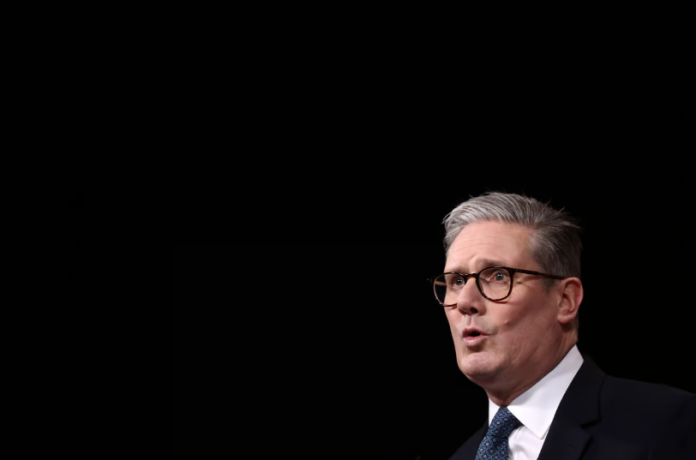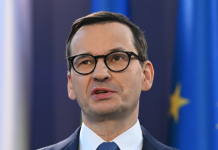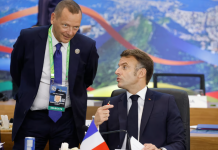
MPs are returning to parliament afresh in 2025. But numerous dangers lurk for the British government.
LONDON — Keir Starmer had a rocky first six months in office — and the road looks set to only get bumpier.
The British prime minister, who took Labour back into power last summer after years in the wilderness, will be hoping a New Year reset can help stabilize his administration, which is currently sinking in the polls and struggling to cut through with voters.
But there are numerous trip wires lying ahead, threatening to make 2025 difficult. With members of parliament returning to parliament this week, let POLITICO walk you through the dangers lurking ahead.
1. Don roaming
One man will tower over pretty much all Starmer’s moves like a heavily branded skyscraper: Donald Trump.
The prime minister will hope to get a visit to the White House in quickly to hold talks with the incoming United States president on a mammoth list of asks. He’ll want to try and limit any tariff pain Trump plans to inflict on allies, and to shore up Ukraine’s position against Russia despite deep skepticism about the war in the incoming U.S. team. Starmer will also hope to limit the chances of fresh meltdown in the Middle East. There’s U.S. support for NATO to be ensured, too — not to mention trying to cool a seemingly nonstop feud with Trump pick Elon Musk. On Sunday, the X owner called him a “national embarrassment.”
2. It’s the stupid economy
Starmer has staked much of his premiership on growing the United Kingdom’s economy, but many of his government’s tough decisions on tax and spending have so far run counter to that.
Official forecasts on March 26 will give an indication of just how bleak the economic picture is. Gross domestic product figures on May 15 mark the earliest date Westminster-watchers will find out whether the economy has really taken a turn for the worse and entered recession.
The pending review in June will set out what constraints are being imposed on squeezed government departments for the coming years.
3. Case for the defense
Starmer promised ahead of his 2024 election win to raise the British defense bill to 2.5 percent of GDP. But he never put a timeline or other specifics on the pledge.
In November he suggested that timeline will finally come in the spring — no doubt to coincide with the results of a “root-and-branch review” of British defense capabilities. With the Conservatives and Nigel Farage’s Reform UK (not to mention Trump) holding his feet to the fire on defense spending, a lackluster timeline could swiftly spark a domestic and international row.
4. Dead serious
After MPs voted to pave the way for legalizing assisted dying in the U.K., the nitty-gritty of detailed scrutiny awaits — as well as the thorny question of what role the government will play if the plan is eventually approved.
While Starmer voted in favor of the move, he refused to get involved in the public debate. It may not be possible for him to avoid getting drawn in altogether, however. The government is expected to produce an impact assessment to inform discussion of the bill, while a clearer outline of the role of medics and judges in delivering the policy will put further strain on a Cabinet already split over the issue.

5. All politics is local
Hundreds of seats on local councils across England will be up for grabs at the start of May. The last time these were fought was in 2021, at a high-water mark for the Tories under Boris Johnson and perhaps the nadir for Starmer’s Labour in opposition. So, as unpopular as Starmer’s government is right now, these could end up being a bad set of results for the Conservatives — and soon morph more into a story about Farage riding a populist wave.
Watch for any donations or backing the insurgent Brexiteer manages to secure from Musk ahead of the vote — and any actions Starmer takes to limit the scope of foreign donations to British parties. A tricky parliamentary by-election could be looming in Runcorn and Helsby, where Reform came second at the election and the sitting Labour MP was charged with assault.
6. Maur problems
Starmer and Foreign Secretary David Lammy are banking on Trump backing their controversial deal to hand the Chagos Islands to Mauritius. The president-elect’s allies have vented their fury about the deal, which Labour argues is necessary to protect the joint U.S.-U.K. military base on Diego Garcia while respecting the rights of Chagos Islanders who were forcibly removed to make way for it.
Critics on the right have cried surrender, but the British government hopes that once Trump’s in office, and sees the evidence from the Pentagon and the State Department about the deal, he’ll be on board. Britain had hoped to get the treaty ratified quickly but Mauritius’ new prime minister looks to be stalling in an attempt for even more favorable terms.
7. Brexit never dies
The right-wing newspapers, Conservatives and Reform are all sharpening their knives to seize on any whiff of a “Brexit betrayal,” while Johnson is already sniping from the sidelines.
Starmer’s spent a lot of his first six months in office on his much-touted “reset” in relations with Europe. But he’d be mistaken if he thinks Brussels won’t use the negotiations to push for wins that’ll be hard for Starmer to sell with Euroskeptics back home.
8. China is fragile
Labour is attempting to soften the U.K. approach to China in comparison to the previous Conservative government, which took an ever-more hawkish stance toward the Asian giant. The new administration launched a China “audit” but appears to have decided on its approach regardless, with numerous ministerial visits to Beijing planned, including a possible trip for Starmer himself.
Talk is about “pragmatic” relations and doing business where possible. But whether the Trump administration allows its “special relationship” partner to have its cake and eat it over China is another matter. The drip drip of stories about Chinese influence operations in the U.K. won’t help.
9. ‘Stop the boats’ headlines
One of the biggest springboards for Farage and Reform has been the issue of small boats filled with irregular migrants crossing the English Channel. Starmer canceled the big-ticket Rwanda deportation scheme the Conservatives never managed to get off the ground as one of his first acts after taking power.
But his own effort to “smash the gangs” profiting from people-smuggling is still to bear fruit, with hundreds of migrants arriving on British shores between Christmas and New Year alone. Numbers that fail to drop could be one of the biggest political risks for Starmer in 2025.
10. Ukraine war endgame?
Britain has been one of Ukraine’s biggest backers ever since Russia launched its full-scale invasion in 2022 — but the military aid it supplies still pales in comparison to what the U.S. provides.
Trump pushing for Ukrainian President Volodymyr Zelenskyy to settle things quickly will usher in a perilous time for the U.K. Could there be a role for British troops in ensuring Ukraine’s security, and what will an emboldened Russian President Vladimir Putin do next?

11. And … a whole heap of other domestic rows
A fight over new inheritance tax rules for farmers will reach its zenith when the changes come into force in April, assuming the government holds its nerve until then.
There are also the six “milestones” the prime minister has set himself before the next election, covering issues such as health services waiting lists and house-building.
If 2025 suggests little progress en route to those targets, Starmer will face pressure over whether his government can even do the basics. Buckle up for a bumpy ride.





















